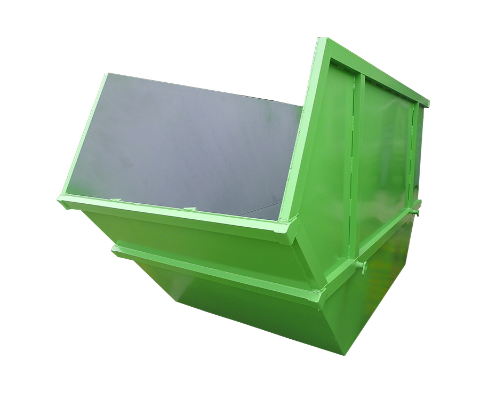Ist ein Selbstkipper die Lösung für eine effiziente Abfallentsorgung? Diese Frage erfordert eine umfassende Analyse des Konzepts der Selbstkipper, ihrer Vorteile und Grenzen sowie ihres Potenzials zur Verbesserung der Abfallentsorgungseffizienz. In diesem Aufsatz werde ich verschiedene Aspekte im Zusammenhang mit SelbstkippBehältern untersuchen und eine fundierte Perspektive auf ihre Wirksamkeit bei der effizienten Abfallentsorgung geben.

Selbstkippende Behälter, auch Selbstentleerbehälter oder Selbstentladebehälter genannt, sind Behälter, die ihren Inhalt automatisch in ein größeres Abfallentsorgungssystem wie einen Müllwagen oder eine Mülldeponie entladen. Sie bestehen normalerweise aus einem großen Behälter mit einem Klapp- oder Kippmechanismus, der es ermöglicht, den Behälter umzukippen und seinen Inhalt auszuschütten. Diese mechanisierte Funktion macht das manuelle Heben oder Handhaben von Abfällen überflüssig und macht die Abfallentsorgung potenziell sicherer und effizienter.
Einer der Hauptvorteile von SelbstKippbehältern ist ihre Fähigkeit, den Abfallentsorgungsprozess zu rationalisieren. Durch die Automatisierung des Entladevorgangs reduzieren sie den Zeit- und Arbeitsaufwand für die Behälterentleerung. Dies kann die Effizienz der Abfallsammlung erheblich verbessern, insbesondere in Bereichen mit hohem Abfallaufkommen wie Gewerbe- oder Industriegebieten, in denen regelmäßig große Abfallmengen anfallen. Darüber hinaus können Selbstkipper möglicherweise den Personalaufwand für die Abfallsammlung reduzieren, was zu Kosteneinsparungen für die Abfallentsorgungsbehörden führt.
Ein weiterer potenzieller Vorteil von Selbstkippbehältern ist ihre Fähigkeit, eine ordnungsgemäße Abfalltrennung zu fördern. Mit dem maschinellen Entladevorgang wird es einfacher, verschiedene Abfallarten in spezielle Behälter oder Fächer zu trennen, was ein effizienteres Recycling oder eine effizientere Entsorgung ermöglicht. Dies kann zu verbesserten Abfallbewirtschaftungspraktiken führen und zur ökologischen Nachhaltigkeit beitragen.
Darüber hinaus können Selbstkipper die Sicherheitsstandards bei der Abfallentsorgung erhöhen. Der manuelle Umgang mit schwerem oder sperrigem Abfall kann verschiedene Risiken für Arbeitnehmer mit sich bringen, beispielsweise Verletzungen des Bewegungsapparates. Der mechanisierte Kippmechanismus reduziert den Bedarf an manuellem Heben und minimiert die körperliche Belastung der Arbeiter. Dies kann zu einer sichereren Arbeitsumgebung für das Abfallentsorgungspersonal führen.
Allerdings weisen Selbstkipper auch bestimmte Einschränkungen auf, die es zu beachten gilt. Erstens erfordert ihre Einführung erhebliche Investitionen in Infrastruktur und Ausrüstung. Die Abfallentsorgungsbehörden müssen die notwendigen Sammelfahrzeuge beschaffen und unterhalten, die in der Lage sind, Selbstkipper aufzunehmen und zu entleeren. Die mit diesem Übergang verbundenen anfänglichen Kosten können erheblich sein und insbesondere für kleinere Gemeinden oder Regionen mit begrenzten Ressourcen zu finanziellen Engpässen führen.
Darüber hinaus muss die Kompatibilität von Selbstkippbehältern mit bestehenden Abfallmanagementsystemen bewertet werden. Die Größe und Gestaltung der Behälter muss sich an den Vorgaben der Sammelfahrzeuge und anderer integraler Bestandteile der Abfallinfrastruktur orientieren. Jegliche Inkonsistenzen oder Inkompatibilitäten könnten die effiziente Funktion des Systems beeinträchtigen und die potenziellen Vorteile von Selbstkippbehältern zunichte machen.
Darüber hinaus kann die Wirksamkeit von Selbstkippern je nach Abfallentsorgungskontext unterschiedlich sein. Beispielsweise kann in Gebieten mit begrenztem Zugang zu großen Abfallentsorgungsanlagen, wie etwa abgelegenen ländlichen Regionen, die Praktikabilität und Durchführbarkeit der Einführung von Selbstkippern eingeschränkt sein. In solchen Fällen könnten alternative Abfallentsorgungslösungen wie dezentrale Kompostierung oder kleinere Sammelmethoden besser geeignet sein.
Zusammenfassend lässt sich sagen, dass selbstkippende Behälter das Potenzial haben, die Effizienz der Abfallentsorgung zu steigern, indem sie den Entladevorgang automatisieren, die Abfalltrennung fördern und die Sicherheitsstandards verbessern. Ihre Wirksamkeit und Praktikabilität hängen jedoch von verschiedenen Faktoren wie Infrastrukturanforderungen, Kompatibilität mit bestehenden Systemen und dem spezifischen Abfallentsorgungskontext ab. Während selbstkippende Behälter in bestimmten Situationen wertvolle Vorteile bieten können, ist eine umfassende Bewertung der Kosten, des Nutzens und der Machbarkeit erforderlich, bevor sie als universelle Lösung für eine effiziente Abfallentsorgung in Betracht gezogen werden.




Kommentar
(0)